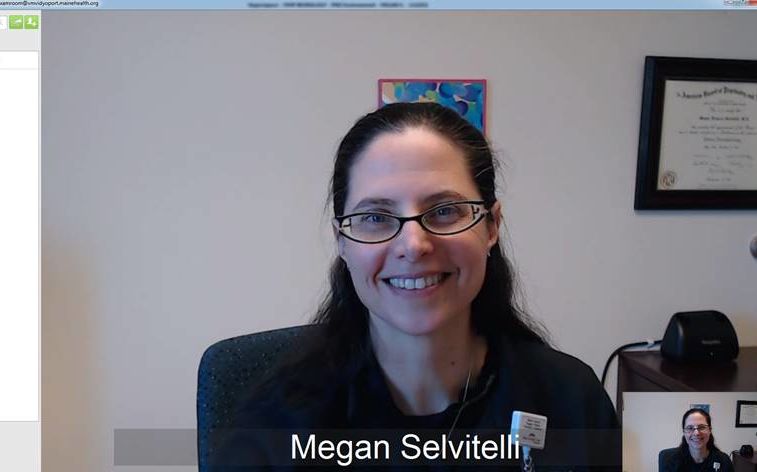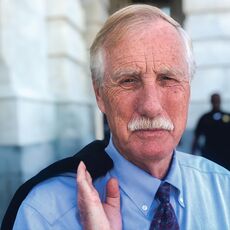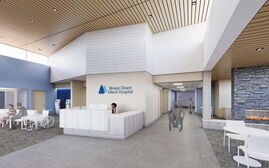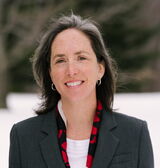
Telehealth takes off in Maine as virtual medical appointments gain ground
 Courtesy / Maine Medical Partners
Pictured on a computer screen, as patients might see her, Megan Selvitelli of Maine Medical Partners Neurology said her team met remotely with about 135 patients in the first 10 days of conducting visits by video.
Courtesy / Maine Medical Partners
Pictured on a computer screen, as patients might see her, Megan Selvitelli of Maine Medical Partners Neurology said her team met remotely with about 135 patients in the first 10 days of conducting visits by video.
Driven by the public health crisis, telehealth services are soaring in popularity as Maine doctors and nurses unable to see patients in person opt for online video appointments instead.
Telehealth practitioners include the neurology team at MaineHealth's Maine Medical Partners, who in the first 10 days of conducting video consultations saw 135 patients, according to Megan Selvitelli.
As division director of Maine Medical Partners Neurology, she leads a team of five pediatric neurologists, four adult inpatient neurologists, 13 adult outpatient neurologists, nine nurse practitioners and one physician assistant.
"Given the restrictions we have right now, I can see a whole lot more patients this way than I ever would be able to in the office," she told Mainebiz. "It's helpful to my patients, and helpful to me."
Though telemedicine is not limited to Maine, proponents see it as particularly beneficial here, particularly for elderly residents in rural communities for whom transportation is an issue.
MaineHealth televisit surge
MaineHealth, the largest health care system in northern New England and Maine's largest private employer, has used telehealth on a local basis going back to 2000. The pandemic prompted the system to ramp that up.
"As of today, all of our primary care practices and specialty practices across our system, at over 100 individual locations, are either live with their ability to see patients in their homes or on their way," said Jasmine Bishop, director of telehealth at MaineHealth.
"These are not directly related to COVID-19, but everything else,” she said. “It's an opportunity for them to get standard care, and to really keep our population as healthy as we can."
Since March 18, MaineHealth has recorded 1,739 telehealth visits with more than 1,300 patients. Over the next six months, nearly 4,000 visits have been scheduled, officials told Mainebiz on Monday.
Success stories include a physician who connected with a patient in her home using Zoom. He noticed she looked ill and after a series of questions, learned she had stopped taking her anti-coagulation medication because her prescription had changed and she could no longer afford it. Because she had not shared that information with her doctor over the phone, it was only over video he could see she looked unwell — and learned information vital to helping prevent a stroke.
Portland-based InterMed PA, Mane's largest physician-owned primary care practice with nearly 100 doctors on staff, is also offering telehealth services during the pandemic.
Users include Scott Patch, a family doctor and the chief information officer with InterMed, who likes the ability to physically assess a patient and make eye contact via video.
“We certainly miss the physical contact with our patients,” he said, “but the video is definitely much better than a phone call."
While InterMed doesn't have specifics on the number of telehealth visits, spokesman John Lamb told Mainebiz they're making up about 25% of previous visits with telehealth, with a goal of moving more follow-ups to televisits in coming weeks.
Other providers
Elsewhere in the state, more than 100 healthcare providers with Bangor-based Penobscot Community Health Care have seen around 2,400 telehealth visits in the past week.

The nonprofit Federally Qualified Health Center has practices and services in the Bangor area as well as Belfast, Jackman and Old Town.
"There were tiny pockets where telehealth was being utilized before this, but not typically for patient visits," said Lori Dwyer, the organization's president and CEO.
Nearly two weeks into the rollout, she said: "There are plans to bring more providers online as equipment becomes available to do so," such as cameras and laptops.
"Our understanding is that a number of other FQHCs have done, or are in the process of doing, the same thing," she added.
Urgent care also goes virtual
Urgent care providers including ConvenientMD Urgent Care and American Family Care (AFC) Urgent Care, in South Portland, are also offering virtual appointments. Both were profiled in a recent Mainebiz feature about the growth of urgent care facilities.
Lynn Derocher, Maine director of business and community relations for ConvenientMD, told Mainebiz that the provider's clinics are open, and that patients in need of care, including those not experiencing COVID-19 symptoms, can feel safe visiting any of their locations for treatment of episodic illness and injury.
"We also know that a lot of people are staying at home eve if they might need medical attention," prompting ConvenientMD to launch daily virtual urgent care or telemedicine services.
She also said that they have temporarily closed their Brunswick clinic "to be as efficient as we can with staff as well as considering personal protective equipment." In partnership with Anthem Blue Cross and Blue Shield in Maine, ConvenientMD is also offering drive-through COVID-19 testing in South Portland.
The bigger picture
Nationwide, the number of virtual medical visits are projected to top 1 billion by year's end.
Proponents include U.S. Sen. Angus King, I-Maine, who addressed the benefits and challenge of telemedicine in an interview last week with Mainebiz.
"What’s really exciting is the development of platforms like Zoom, that you don’t need a lot of special equipment," he said by phone from Brunswick, where he is self-quarantining. "A patient in a house on the outskirts of Sangerville, or in the outskirts of Dover-Foxcroft, can be in touch and be seen by a physician, much easier and more efficiently than would be the case if they had to find a ride and wait in a waiting room with a lot of other people."
Asked about the barriers, he said: "It doesn’t work if you don’t have broadband ... The second problem with telehealth is regulation, and I’m happy to say that the the COVID-3 [federal relief] bill that just passed eased up on some of the regulation."
At state level, a new order from Augusta aligns Maine with federal guidance and improves the affordability of needed health care services delivered through telehealth.
Signed last week by Superintendent of Insurance Eric Cioppa, the order requires insurers to provide coverage for clinically appropriate services delivered by phone, as well as apps like FaceTime and Skype, as long as they are private.
The aim is to open telehealth services to patients without access to web-based applications during the crisis.
Long-term view
Though it's not yet clear how long the pandemic will last and necessitate more appointments by video, some see long-term potential for telehealth in Maine when life gets back to normal.

"It makes total sense," said King in last week's interview. "One of the most expensive parts of our health care system is the emergency room, and to the extent we can triage people electronically, and keep them out of the emergency room, when it’s not necessary, that will be saving to the entire health care system and it will provide better care to the patient."
Mitchell Stein, a Brunswick-based independent health care consultant, has a similar view.
"If you think about most visits with your doctor, the conversation is the most important part," he said.
While doctors can't check things like blood pressure or knee reflexes remotely via video, "the most important thing is talking about symptoms and figuring out what's going on," he noted. "Telemedicine can't replace everything, but it can replace a lot."














0 Comments